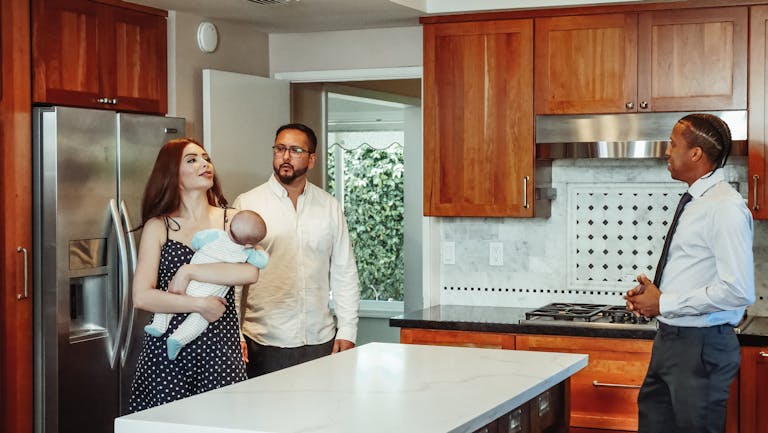First Time Home Buyer Questions On How To Qualify For Mortgages
This BLOG On First Time Home Buyer Questions On How To Qualify For Mortgages Was UPDATED And PUBLISHED On June 15th, 2020
Buyers who are a first time home buyer, chances are they will have many first time home buyer questions
- May not know where to start or who to ask
First time home buyers have come to the right place:
- As a residential mortgage lender, a large percentage of our business is representing first time home buyers
- There are many common first time home buyer questions which we will cover on this blog article
- For most of us, a home purchase is or will be the biggest investment they will make in their lifetime
- A sound financial decision needs to be thoroughly made
Below are common first time home buyer questions. Homebuyers who have any further questions, please do not write us a note at gcho@gustancho.com.
First Time Home Buyer Questions On Buying Versus Renting
One of the most common first time home buyer questions is whether it is better to buy a home or rent a home.
- Most folks feel that buying a home versus renting a home is a no brainer
- They do not weigh the options and pros and cons of buying versus renting a home
- Advantages of buying a home versus renting a home really depends on each individual
- It depends on what their financial and personal needs are
- Buying a home versus renting a home can be a great investment for one individual
However, it may not be suited for another.
Things To Consider When Buying A Home
Some factors that need to be considered when deciding on buying versus renting a home are the following:
- how stable is your job
- is there a possibility of getting transferred involuntarily
- how much are you currently paying for rent
- have you determined whether you will stay in the area you will be buying your home for at least five or more years
- do you have the minimum down payment and closing costs required to purchase a home
- are your credit and financials ready for you to get a loan pre-approval from a mortgage lender
There are other considerations depending on each individual.
How Much Home Can I Afford?
Part of the home buying process should include how much home can you afford and not what you qualify for.
- A loan officer may qualify a home buyer for a $350,000 home loan with a monthly PITI ( Principal, Interest, Taxes, Insurance ) payment of $2,300
- But that may be too much home payment for a home buyer and their family
- Remember lenders will not take into account utilities, maintenance cost, personal expenditures such as vacation money, childcare, education expenses, and other personal expenses
- Besides the mortgage payment, homeowners need to consider utilities such as electricity, gas, cable, internet service, water, scavenger services, and monthly maintenance costs
- There are added costs in being a homeowner versus renters such as water bills, scavenger, landscaping/snow removal service, and general maintenance
As a renter, it was included in monthly rental payments but as a homeowner, it will be the owner’s responsibility.
What Is Better? Existing Home Or New Home
The advantage of purchasing an existing home is that it is much more convenient and is much faster.
- Once buyers decided on purchasing an existing home and have the sales contract signed by both the buyers and sellers, it can be closed and moved in to their new home in as little as 30 days
- Disadvantages of buying an existing home are that homeowners cannot customize the features of the home
- Existing home buyers get what the existing home comes
- Cannot choose the selection of granite countertops, choice of pain, choice of flooring/tiles, appliances, layout, or other features
- An existing home will probably need to have work done on the home to fit the needs to the new home buyer
- May need basic repairs as well due to not everything being new and used by the previous homeowner
- Existing home has aged landscaping
The neighborhood is developed with mature trees whereas, with a new home, owners will need to start planting new trees and shrubs.
Other Benefits Of Buying A Brand New Home
Also, the major benefits of purchasing a brand new home include the following:
- building the home to specific custom needs with the layout
- colors of the walls
- flooring selection to suit needs
- choice of appliances
- upgrades to the home by the builder as long as they are able to afford it
Disadvantages include that new homes take longer to close and move in, normally six months.
Choosing A Mortgage Lender
Unless purchasing a home with cash, home buyers will need to choose a lender.
- There are a variety of ways of choosing a mortgage lender and not all mortgage lenders may be the right lender for you depending on your credit and financial profile
- If you have very high credit scores, perfect credit, and solid income, you can about go anywhere and shop for the best mortgage rates and terms
Unfortunately, many first time home buyers or seasoned home buyers may have the following:
- had prior credit issues
- bankruptcy
- foreclosure
- low credit scores
- unpaid collection accounts
- judgments
- tax liens
- high debt to income ratios
- recent late payments
Qualifying For A Home Loan With Bad Credit
Homebuyers can qualify for a home loan with bad credit:
- If seeking a home loan with bad credit, a bank or credit union is not the place to go to
- Most banks and credit unions require a minimum credit score of 640
- They require no collection accounts with unpaid balances
- Most have mortgage lenders overlays on debt to income ratios that will cap the debt to income ratio at 45%
- The federal maximum debt to income ratio cap on FHA Loans is 56.9% back end and 46.9% front end to get an approve/eligible per automated underwriting system approval
Homebuyers with bad credit, the best lender to go to is a direct lender with no overlays such as Gustan Cho Associates Mortgage Group.
First Time Home Buyer Questions: What Are Lender Overlays
There are two types of mortgage lending guidelines.
- The first type of mortgage guidelines are federal lending guidelines which are set by FHA, VA, USDA, FANNIE MAE, FREDDIE MAC
- The second type of mortgage guidelines is lenders’ own set of guidelines which are overlays.
The best way to explain lender overlays is to use an example.
- For example, the minimum credit scores required by HUD to qualify for a 3.5% down payment home purchase FHA Loan is a minimum credit score of 580
- A mortgage lender like myself will just go off HUD lending guidelines of the 580 credit score
- We can close this FHA Loan for this borrower as long as the borrower meets all other qualifications such as income and other conditions requested by the Automated Underwriting System
- However, most lenders will most likely not accept a borrower with a 580 credit score
- Will require a minimum credit score of 640 even though the federal minimum FHA credit score requirements is 580
This is called an overlay on credit scores.
First Time Home Buyer Questions: Understanding Overlays By Lenders
Overlays are implemented by the individual mortgage lender:
- Another example is debt to income ratio overlays
- The maximum debt to income ratio allowed per HUD guidelines on borrowers with at least a 620 credit score is 56.9%
- However, most lenders will not accept any borrowers with a debt to income ratio of greater than 45%
- This is called a lender overlay on debt to income ratios
- One last and final example is lender overlays on collection accounts
- HUD does not require borrowers to pay off old collection accounts even though there is an unpaid balance
- However, many mortgage lenders, especially banks, will require that all old collection accounts with balances be paid off
- This is called a mortgage lender overlay on collection accounts
Homebuyers with prior credit issues, low credit scores, high debt to income ratios, and need a direct mortgage lender with no overlays, please contact us at Gustan Cho Associates at 800-900-8569 or text us for faster response. Borrowers can email us at gcho@gustancho.com.








